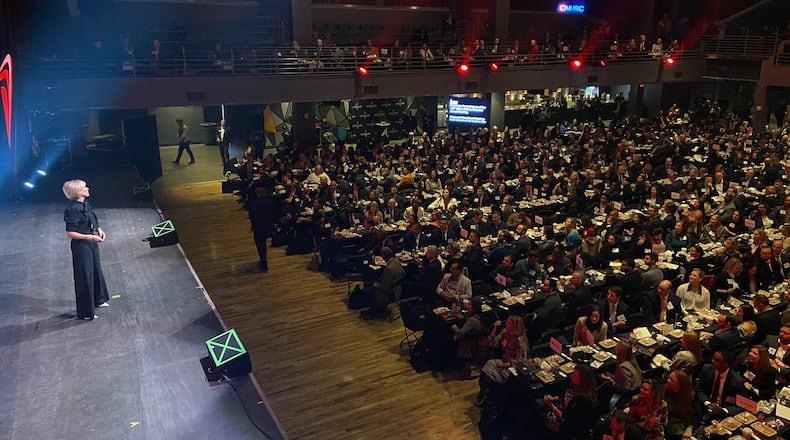The Metro Atlanta Chamber said Thursday it will focus in the New Year on expanding the pipeline of skilled workers, marketing the region in new ways and maintaining economic success amid global challenges.
The chamber held its 163rd annual meeting at the Coca-Cola Roxy near Truist Park, the first in-person meeting since before the pandemic. Nearly every speaker, which included Mayor Andre Dickens and several Atlanta-based CEOs, focused on talent development as the top priority for maintaining the region’s economic mojo.
The chamber recently unveiled a new strategic plan to focus on emerging industries, workforce development and green energy.
Georgia and the Atlanta area are enjoying unemployment rates near record lows, and the state of Georgia’s jobs posting lists more openings than unemployed workers seeking jobs in the state. Efforts by the Federal Reserve to tame raging inflation have started to cool the economy, but the region’s jobs engine keeps on humming.
“Growth does happen here, and it starts with talent,” Norfolk Southern CEO Alan Shaw told the audience of hundreds. “It starts with creating an environment where talent can thrive.”
Chamber CEO Katie Kirkpatrick rattled off wins of the past year, from major jobs announcements like Freyr Battery and electric vehicle upstart Rivian to fending off an effort to carve a Buckhead City from the city of Atlanta. This year’s announcement that Atlanta will be one of 16 North American host cities for the 2026 FIFA World Cup will again thrust the region onto a global stage.
The city of Atlanta under Dickens and the state of Georgia under Gov. Brian Kemp again are enjoying warm relations.
“The state and the city are getting along very, very well. And if we harness that energy and if we get that right, then the world is our oyster going forward,” Kirkpatrick said.
But the Atlanta region also faces challenges, including deep economic disparities by race.
The chamber launched its ATL Action for Racial Equity initiative last year to combat systematic racism by providing educational materials to companies to help with diversity efforts. More than 250 companies have joined the program.
“Longstanding disparities in wealth and income are interrelated. You can’t build wealth without income ... you can’t get a good job without skills, so we need to offer people the pathways that lead to skills and opportunity,” said Raphael Bostic, the 2022 chamber chair and president of the Federal Reserve Bank of Atlanta.
The chamber is preparing for several changes and new faces in the next few months.
Rep. Jon Burns is about to take the reigns as speaker of the Georgia House of Representatives following 13 years of leadership from David Ralston, the longtime bedrock of Georgia politics, who died Wednesday. Burt Jones is set to take up the office of lieutenant governor.
Amid that change, the state’s top office will remain constant with Kemp’s re-election.
Chamber President Katie Kirkpatrick said Thursday that she expects the next four years to focus on a handful of critical initiatives to keep the state competitive on a national — and international — stage.
“It’s very important for the state to continue to do things like invest in infrastructure, invest in our education system and invest in our health care system,” she said. “Those are the three underpinnings for our healthy, safe communities.”
Questions about safety and gun policies cost Atlanta its marquee concert event, Music Midtown, earlier this year. The cancellation was tied to a 2014 law that prohibits private groups from restricting guns from short-term events held on public land, including Piedmont Park.
Kirkpatrick said Atlanta continues to land large events, such as high-profile college football games and the World Cup, but she said the chamber will prioritize making sure events can take place safely in the city.
“When we think ahead and what might impact those events, whether it be traffic or transportation or security, we’ll certainly be paying attention to what we can do to ensure those events can happen in a safe and secure way,” Kirkpatrick said.
Asked other legislative priorities, chamber officials mentioned investments in education, particularly expansion of technical college programs.
“If we can continue to see the state making that investment along with the local partners, then we’ll continue to grow as the number one place for business,” Kirkpatrick said.
About the Author
Keep Reading
The Latest
Featured


